Charles E W Bean, Diaries, AWM38 3DRL 606/273/1 - 1918 - 1937 - Part 11
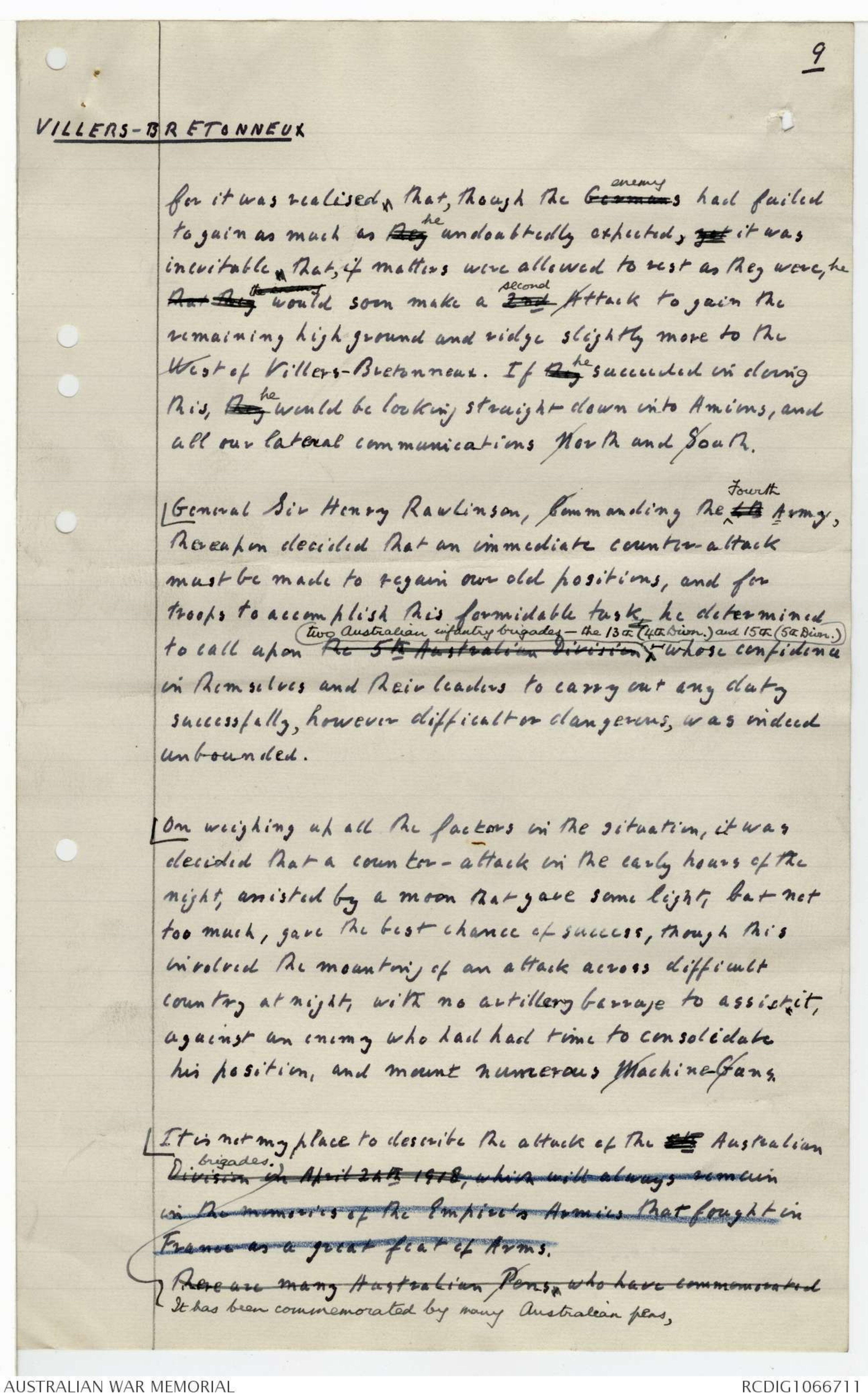
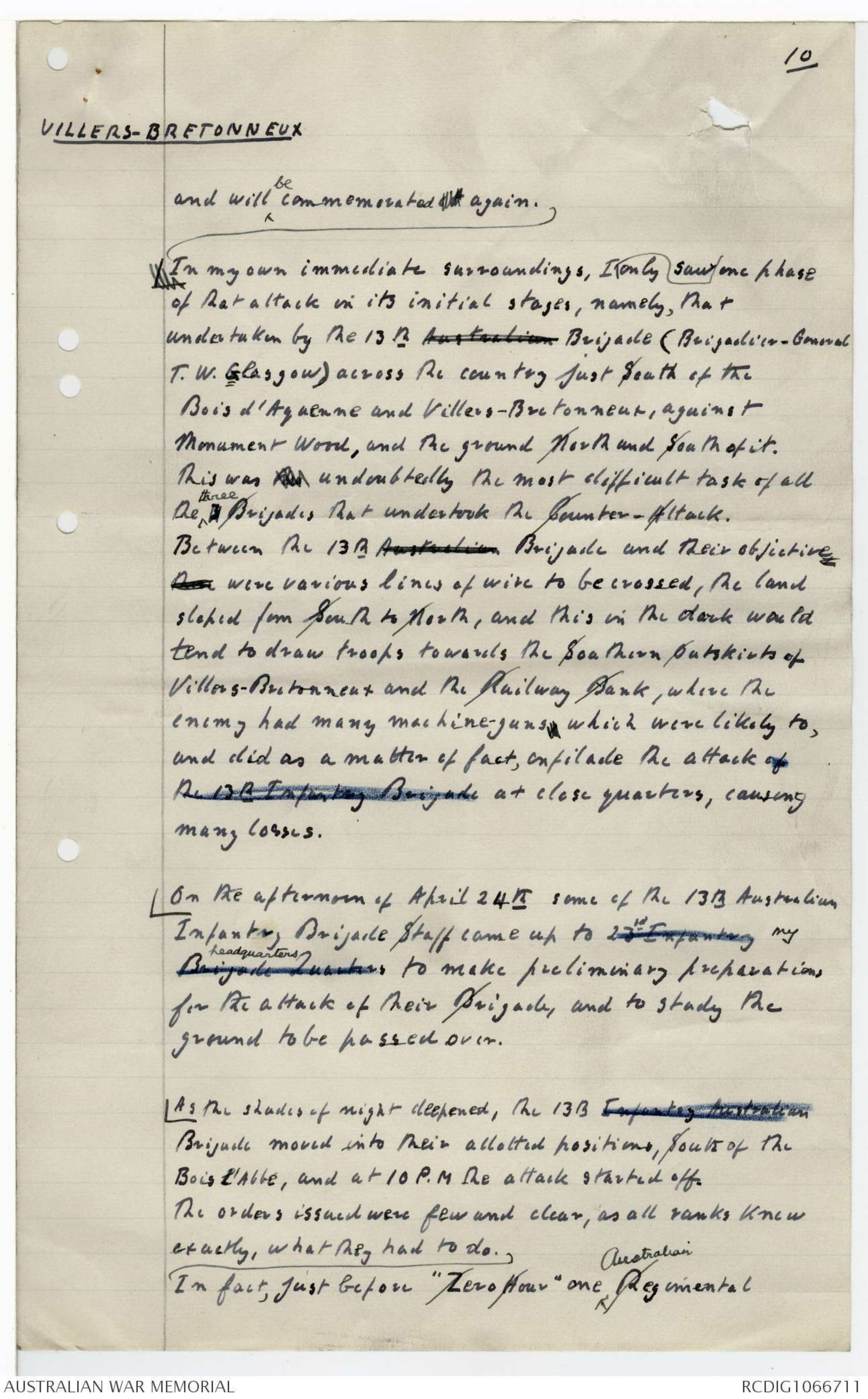
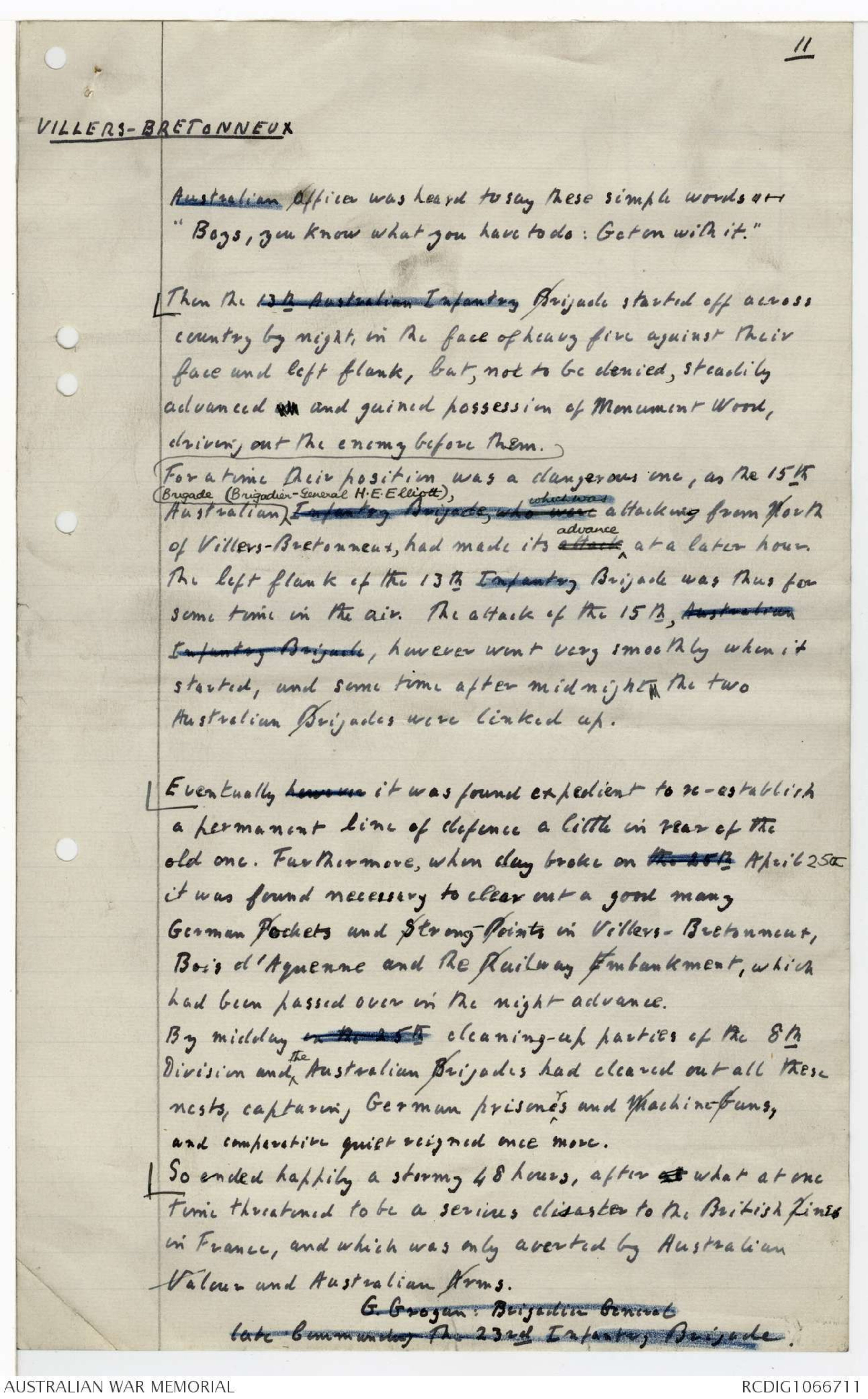
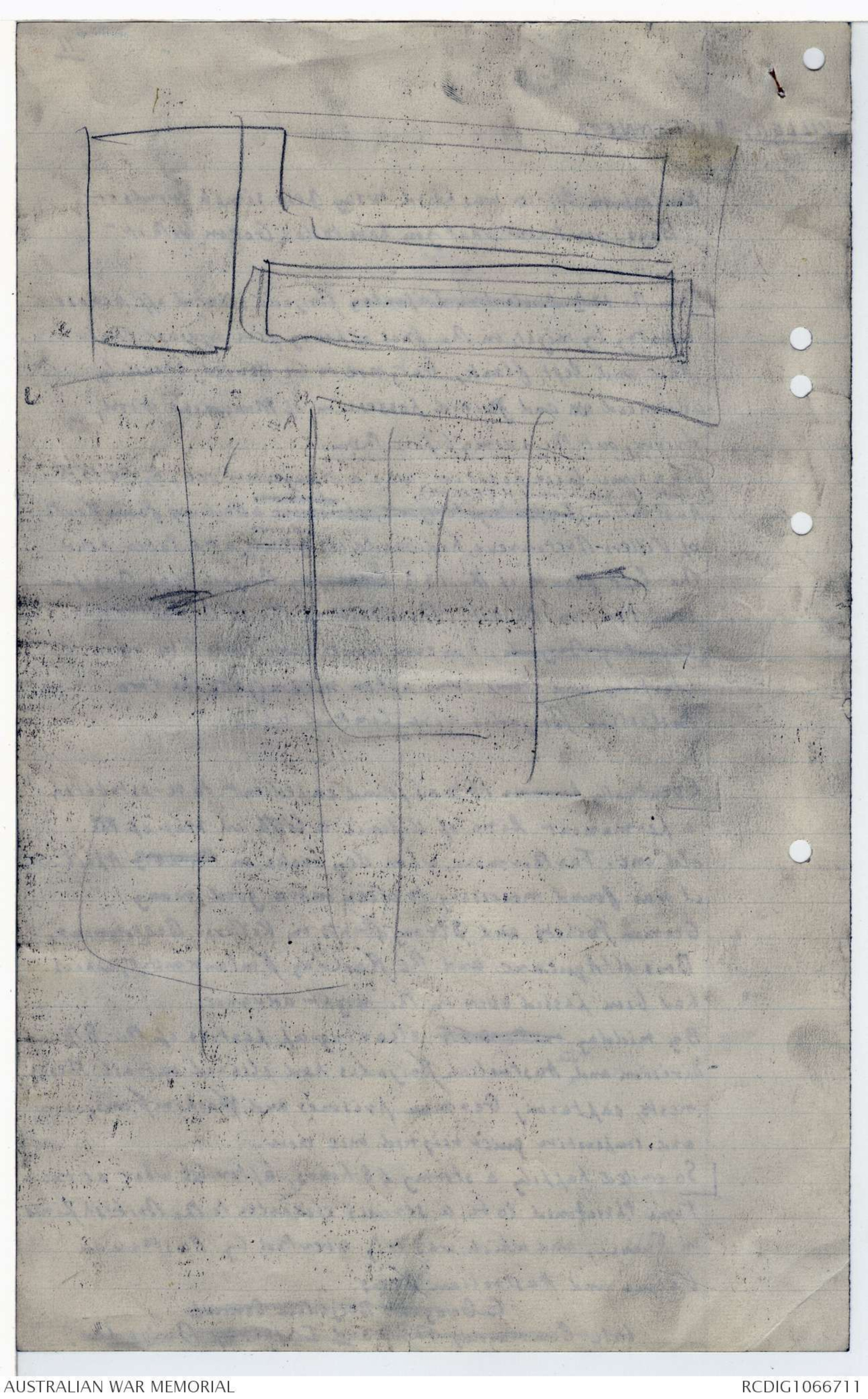
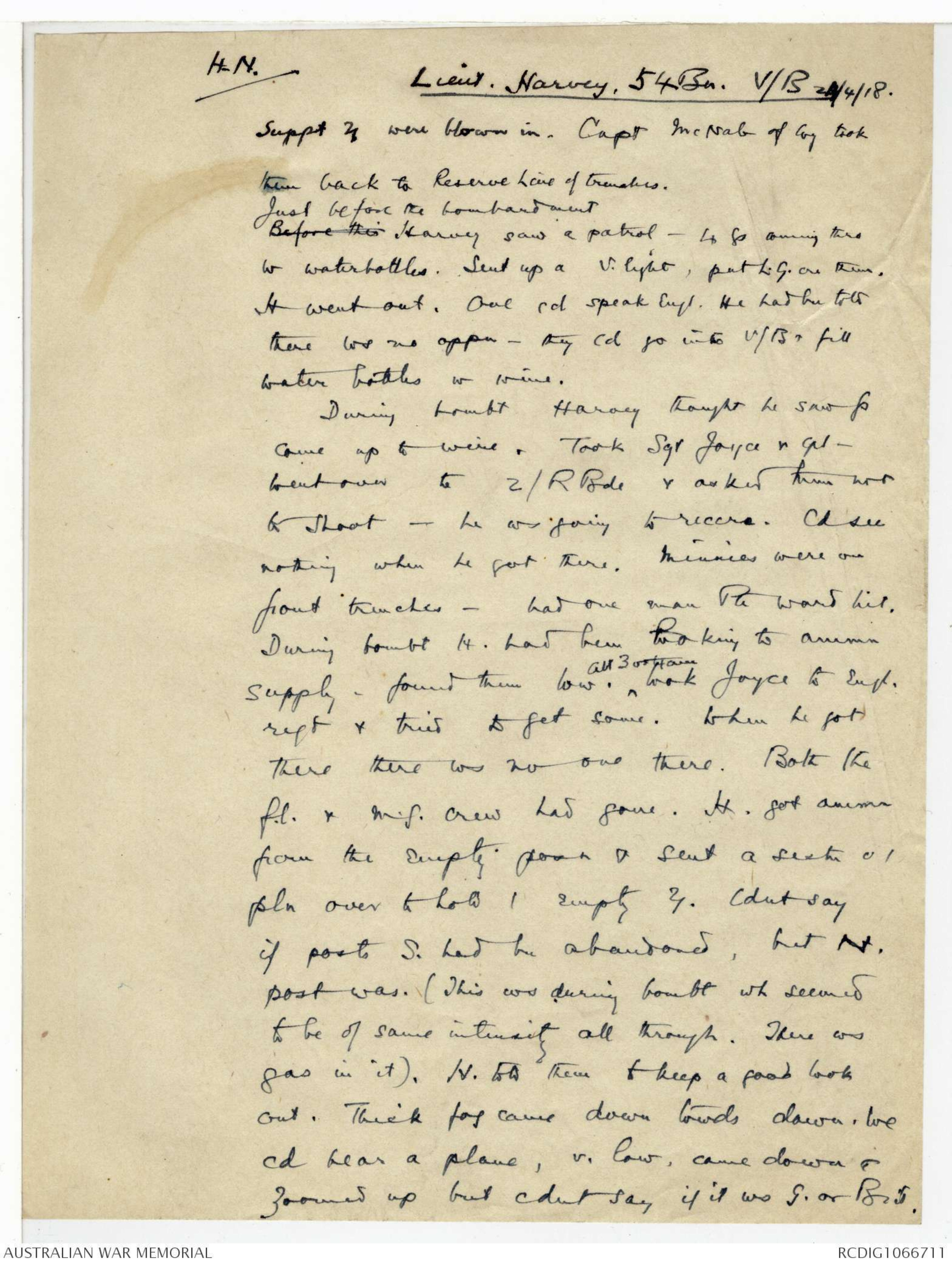
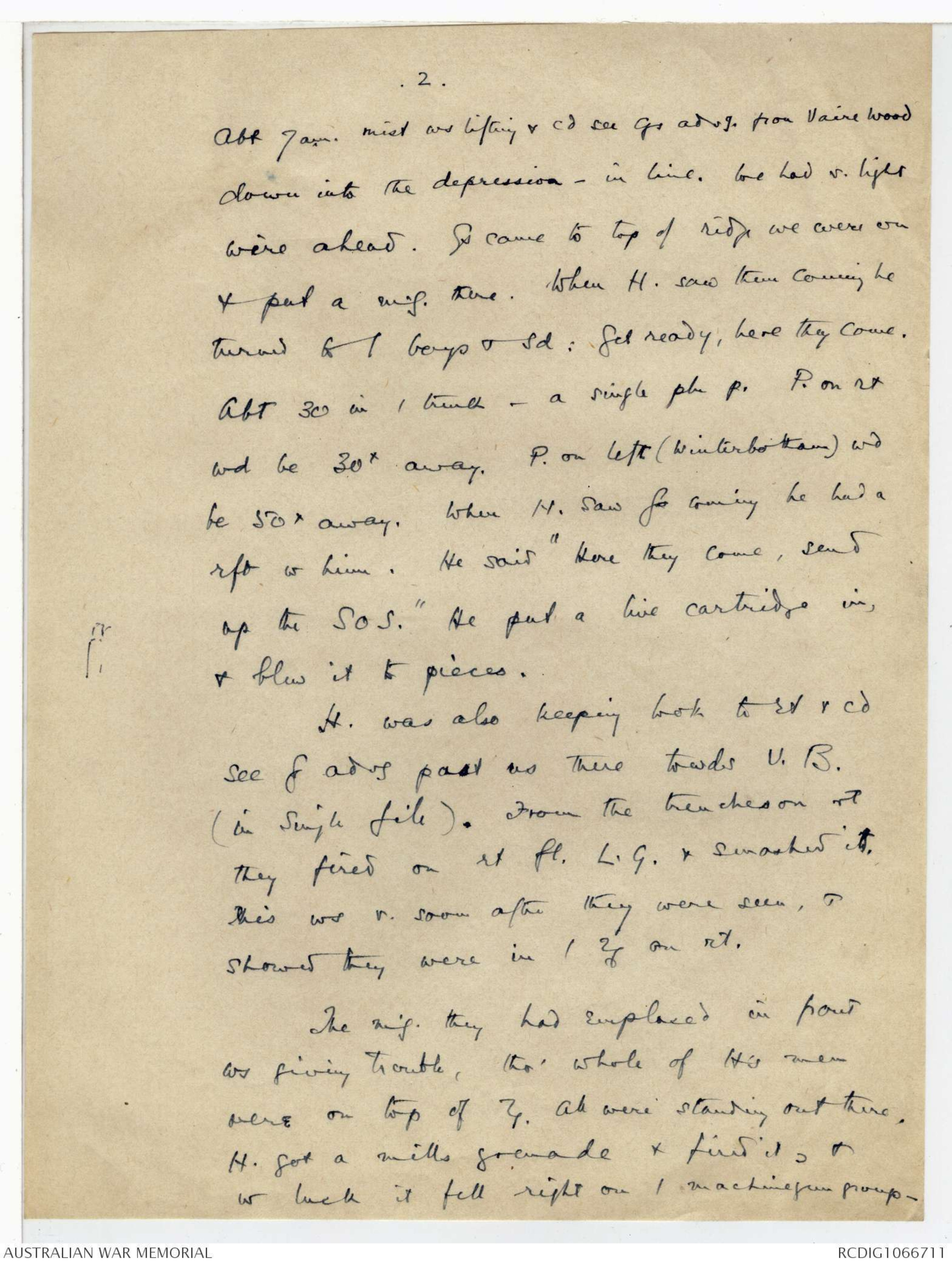
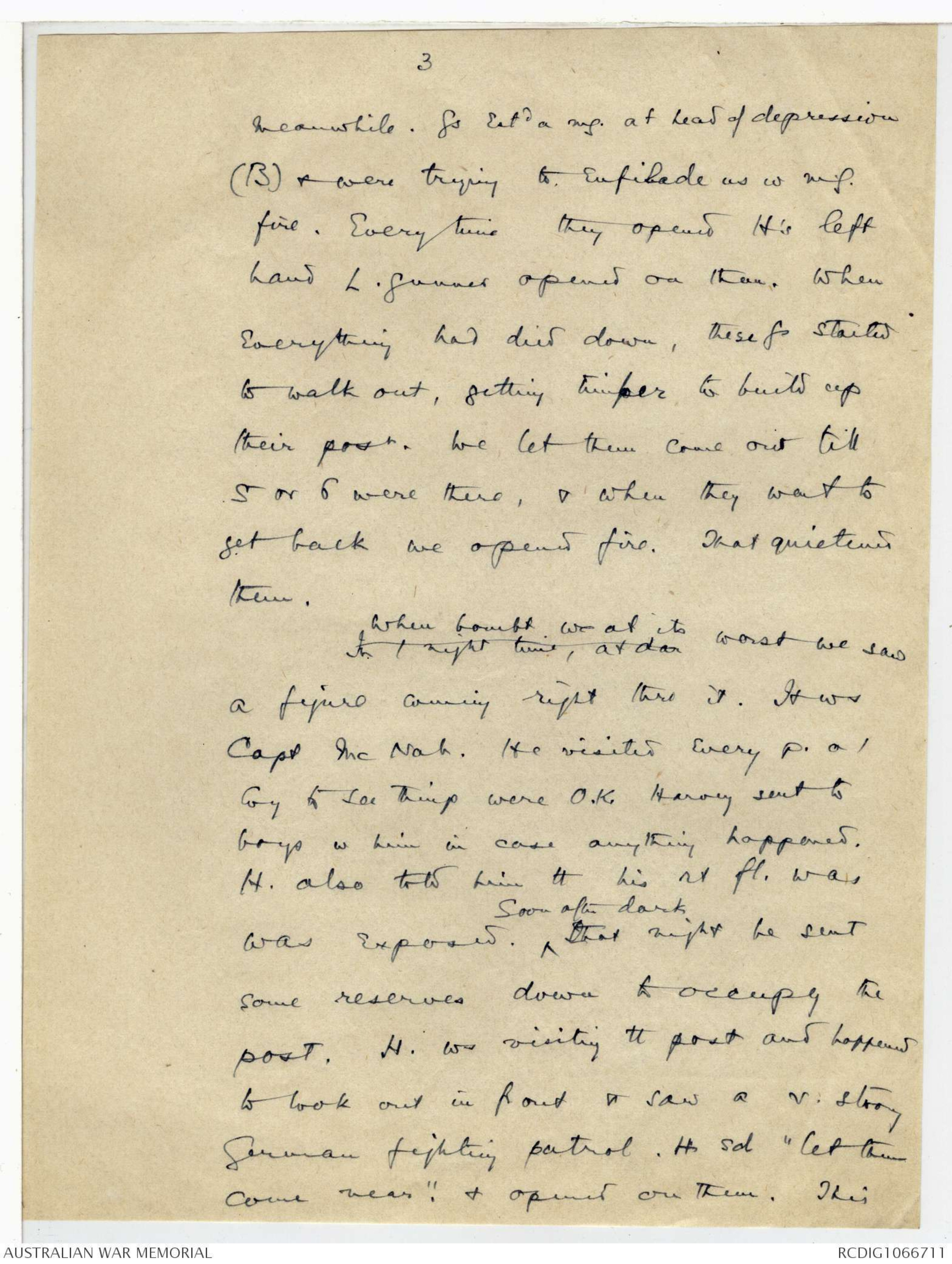
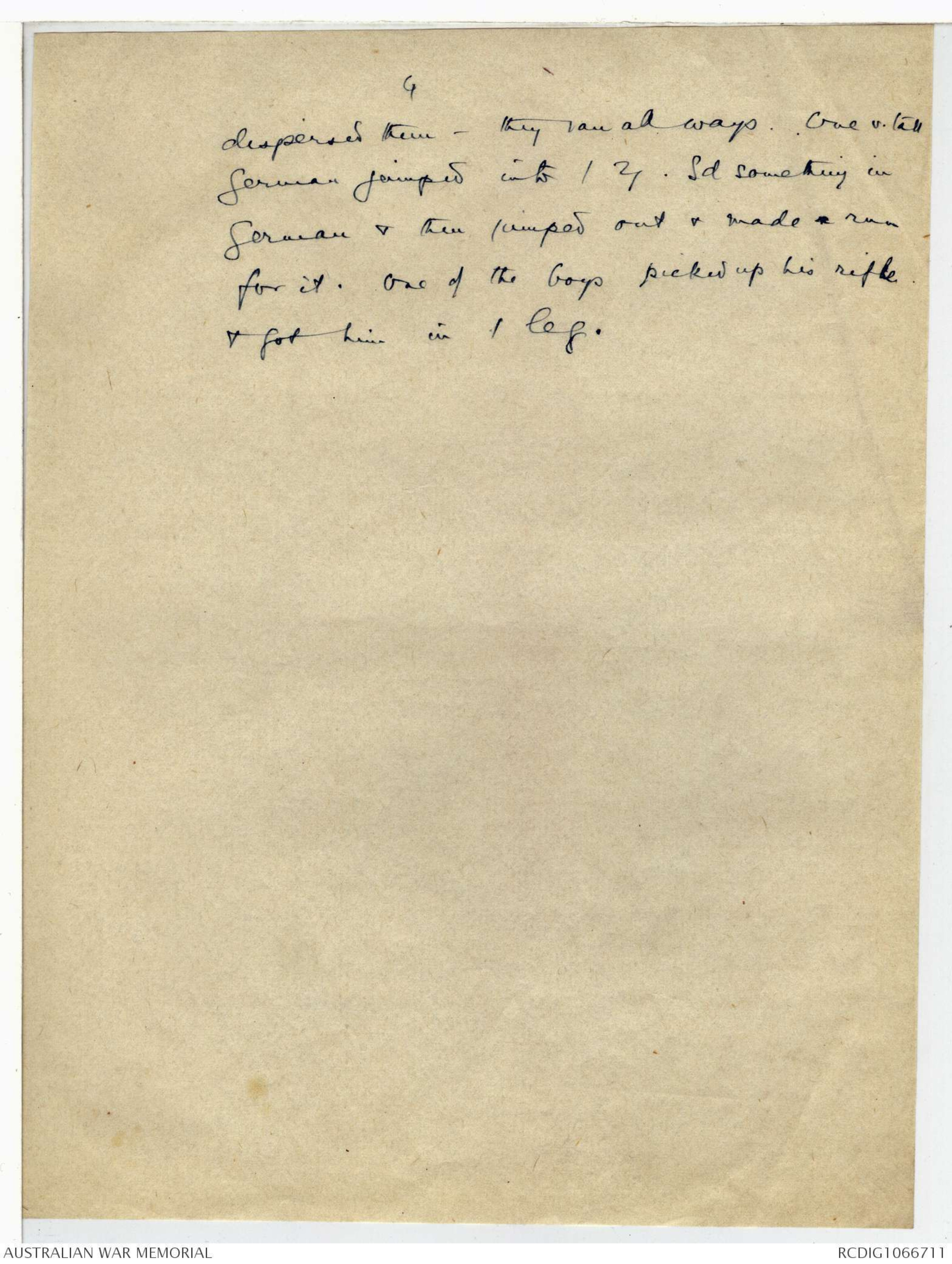
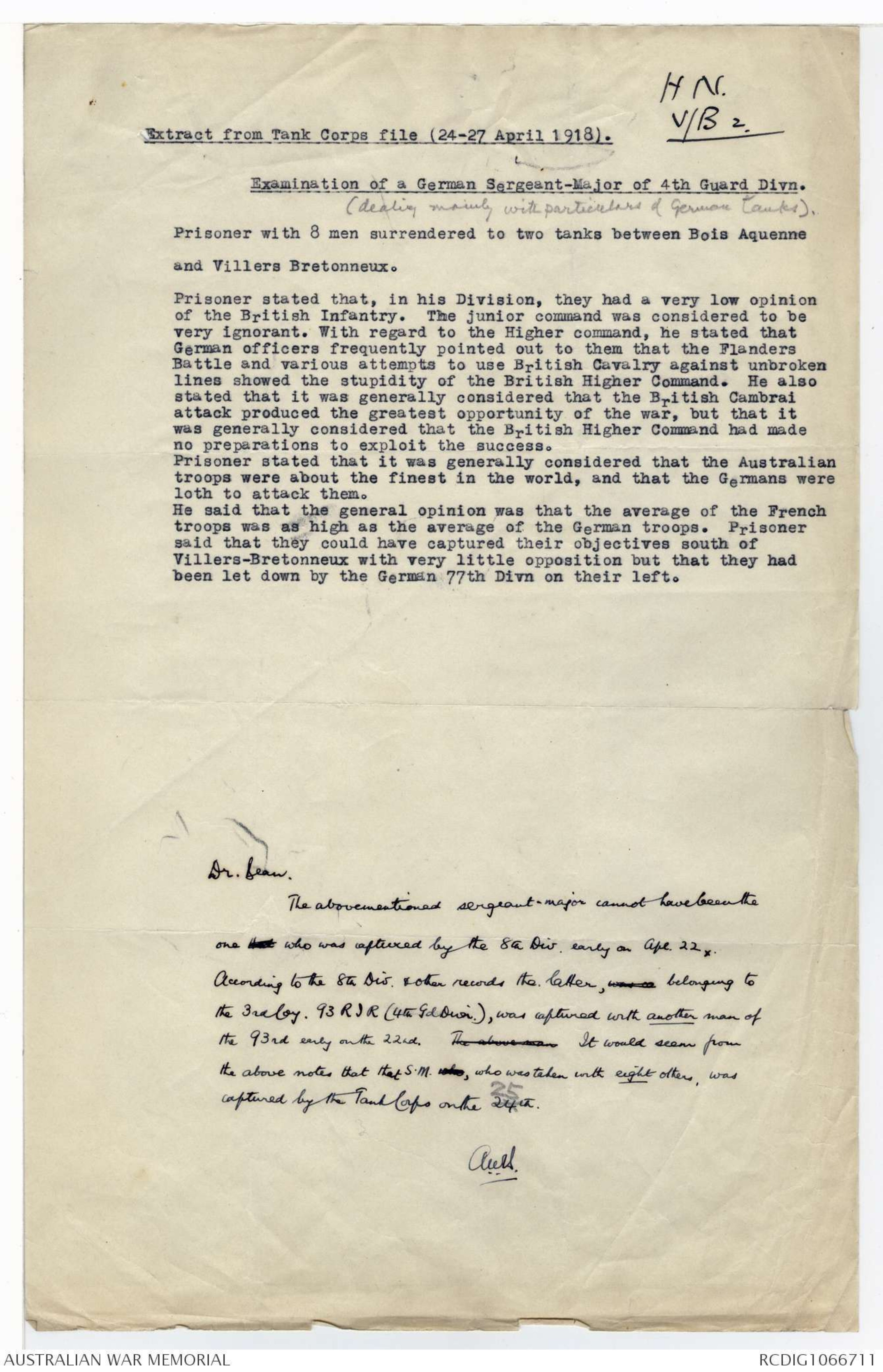
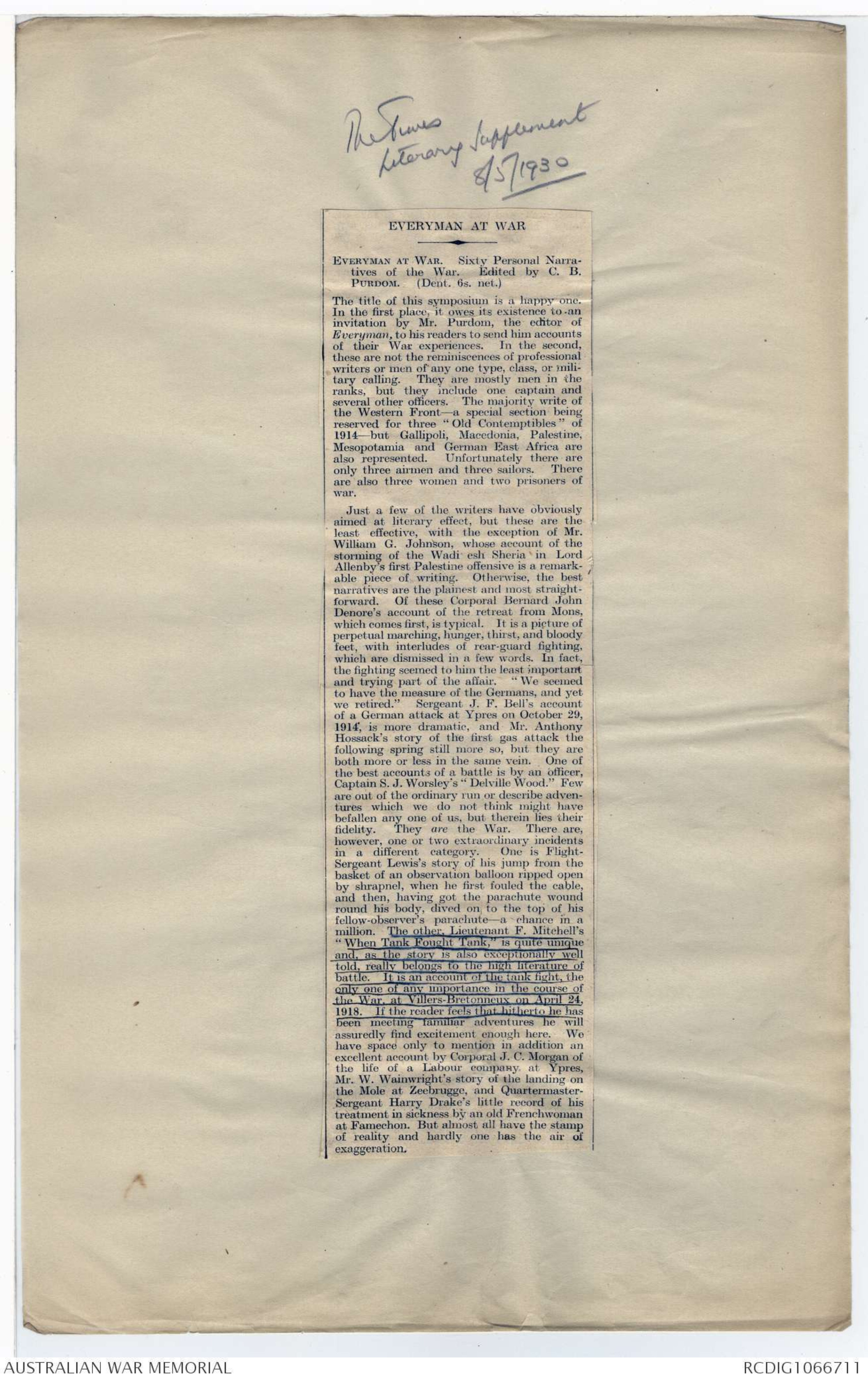
9
VILLERS-BRETONNEUX
for it was realised , that, though the Germans enemy had failed
to gain as much as they he undoubtedly expected, yet it was
inevitable, that, if matters were allowed to rest as they were, he
that they the enemy would soon make a 2nd second Attack to gain the
remaining high ground and ridge slightly more to the
West of Villers-Bretonneux. If they he succeeded in doing
this, they he would be looking straight down into Amiens, and
all our lateral communications North and South.
General Sir Henry Rawlinson, Commanding the 4th Fourth Army,
thereupon decided that an immediate counter-attack
must be made to regain our old positions, and for
troops to accomplish this formidable task, he determined
to call upon the 5th Australian Division ^two Australian infantry brigades-the 13th (4th Divn.) and 15th (5th Divn.) - whose confidence
in themselves and their leaders to carry out any duty
successfully, however difficult or dangerous, was indeed
unbounded.
On weighing up all the factors in the situation, it was
decided that a counter-attack in the early hours of the
night, assisted by a moon that gave some light, but not
too much, gave the best chance of success, though this
involved the mounting of an attack across difficult
country at night, with no artillery barrage to assist, it,
against an enemy who had had time to consolidate
his position, and mount numerous Machine-Guns.
It is not my place to describe the attack of the 5th Australian
Division brigades. in April 24th, 1918, which will always remain
in the memories of the Empire's Armies that fought in
France as a great feat of Arms.
There are many Australian Pens, who have commemorated
It has been commemorated by many Australian pens,
10
VILLERS-BRETONNEUX
and will ^be commemorated at again.
In my own immediate surroundings, I saw only one phase
of that attack in its initial stages, namely, that
undertaken by the 13th Australian Brigade (Brigadier-General
T.W. Glasgow) across the country just South of the
Bois d'Aquenne and Villers-Bretonneux, against
Monument Wood, and the ground North and South of it.
This was xxx undoubtedly the most difficult task of all
the ^three 3 Brigades that undertook the Counter-Attack.
Between the 13th Australian Brigade and their objective,
there were various lines of wire to be crossed, the land
sloped from South to North, and this in the dark would
tend to draw troops towards the Southern Outskirts of
Villers-Bretonneux and the Railway Bank, where the
enemy had many machine-guns, which were likely to,
and did as a matter of fact, enfilade the attack of
the 13th Infantry Brigade at close quarters, causing
many losses.
On the afternoon of April 24th some of the 13th Australian
Infantry Brigade Staff came up to 23rd Infantry my
Brigade Quarters headquarters to make preliminary preparations
for the attack of their Brigade, and to study the
ground to be passed over.
As the shades of night deepened, the 13th Infantry Australian
Brigade moved into their allotted positions, South of the
Bois l'Abbe, and at 10 P.M the attack started off.
The orders issued were few and clear, as all ranks knew
exactly, what they had to do.
In fact, just before "Zero Hour" one ^Australian Regimental
11
VILLERS-BRETONNEUX
Australian Officer was heard to say these simple words -
"Boys, you know what you have to do: Get on with it."
Then the 13th Australian Infantry Brigade started off across
country by night, in the face of heavy fire against their
face and left flank, but, not to be denied, steadily
advanced xx and gained possession of Monument Wood,
driving out the enemy before them.
For a time their position was a dangerous one, as the 15th
Australian ^Brigade (Brigadier-General H.E. Elliott), Infantry Brigade, who were which was attacking from North
of Villers-Bretonneux, had made its attack ^advance at a later hour.
The left flank of the 13th Infantry Brigade was thus for
some time in the air. The attack of the 15th, Australian
Infantry Brigade, however went very smoothly when it
started, and some time after midnight, the two
Australian Brigades were linked up.
Eventually however it was found expedient to re-establish
a permanent line of defence a little in rear of the
old one. Furthermore, when day broke on the 25th April 25th
it was found necessary to clear out a good many
German Pockets and Strong-Points in Villers-Bretonneux,
Bois d'Aquenne and the Railway Embankment, which
had been passed over in the night advance.
By midday on the 25th cleaning-up parties of the 8th
Division and ^the Australian Brigades had cleared out all these
nests, capturing German prisone^rs and Machine-Guns,
and comparative quiet reigned once more.
So ended happily a stormy 48 hours, after as what at one
time threatened to be a serious disaster to the British Lines
in France, and which was only averted by Australian
Valour and Australian Arms.
G. Grogan: Brigadier General
late Commanding the 23rd Infantry Brigade.
Diagram - see original document
[*H.N.*]
Lieut. Harvey, 54 Bn. V/B 24/4/18.
Suppt trenches were blown in. Capt McNab of Coy took
them back to Reserve Line of trenches.
Just before the bombardmentBefore this Harvey saw a patrol - 4 Gs coming thro
w waterbottles. Sent up a V. light, put L.G. on them.
H went out. One cd speak Engl. He had bn told
there ws no oppn - they cd go into V/B & fill
water bottles w wine.
During bombt Harvey thought he saw Gs
come up to wire. Took Sgt Joyce & Cpl -
went over to 2/R Bde & asked them not
to shoot - he ws going to reccre. Cd see
nothing when he got there. Minnies were on
front trenches - had one man Pte Ward hit.
During bombt H. had been looking to ammn
supply - found them low. ^Abt 3 or 4 am took Joyce to Engl.
regt & tried to get some. When he got
there there ws no one there. Both the
f.l. & m.g. crew had gone. H. got ammn
from the empty posn & sent a sectn o /
pln over to hold / empty trench. Cdnt say
if posts S. had bn abandoned, but N.
post was. (This ws during bombt wh seemed
to be of same intensity all through. There ws
gas in it). H. told them to keep a good look
out. Thick fog came down towds dawn. We
cd hear a plane, v. low, came down &
zoomed up but cdnt say if it ws G. or Brit.
. 2 .
Abt 7 a.m. mist ws lifting & cd see Gs advg. from Vaire Wood
down into the depression - in line. We had v. light
wire ahead. Gs came to top of ridge we were on
& put a m.g. there. When H. saw them coming he
turned to / boys & sd: Get ready, here they come.
Abt 30 in / trench - a single pln p. P. on rt
wd be 30x away. P. on left (Winterbotham) wd
be 50x away. Where H. saw Gs coming he had a
rft w him. He said "Here they come, send
up the SOS". He put a live cartridge in,
& blew it to pieces.
H. was also keeping look to rt & cd
see G advg past us there towds V. B.
(in single file). From the trenches on rt
they fired on rt fl. L.G. & smashed it.
This ws v. soon after they were seen, &
showed they were in / trenches on rt.
The m.g. they had emplaced in front
ws giving trouble, tho' whole of H's men
were on top of trench. All were standing out there,
H. got a mills grenade & fired it, &
w luck it fell right on / machine gun group -
3
Meanwhile. Gs estd a mg. at head of depression
(B) & were trying to enfilade us w m.g.
fire. Every time they opened H's left
hand L. gunner opened on them. When
everything had died down, these Gs started
to walk out, getting timber to build up
their posn. We let them come out till
5 or 6 were there, & when they went to
get back we opened fire. That quietened
them.
In / night time, at dar When bombt ws at its worst we saw
a figure coming right thro it. It ws
Capt McNab. He visited every p. o /
Coy to see things were O.K. Harvey sent to
boys w him in case anything happened.
H. also told him tt his rt fl. was
was exposed. ^Soon after dark that night he sent
some reserves down to occupy the
post. H. ws visiting tt post and happened
to look out in front & saw a v. strong
German fighting patrol. H sd "let them
come near", & opened on them. This
4
dispersed them - they ran all ways. One v. tall
German jumped into / trench. Sd something in
German & then jumped out & made a run
for it. One of the boys picked up his rifle
& got him in / leg.
[*HN.
V/B 2.*]
Extract from Tank Corps file (24-27 April 1918).
Examination of a German Sergeant-Major of 4th Guard Divn.
(dealing mainly with particulars of German tanks).
Prisoner with 8 men surrendered to two tanks between Bois Aquenne
and Villers Bretonneux.
Prisoner stated that, in his Division, they had a very low opinion
of the British Infantry. The junior command was considered to be
very ignorant. With regard to the Higher command, he stated that
German officers frequently pointed out to them that the Flanders
Battle and various attempts to use British Cavalry against unbroken
lines showed the stupidity of the British Higher Command. He also
stated that it was generally considered that the British Cambrai
attack produced the greatest opportunity of the war, but that it
was generally considered that the British Higher Command had made
no preparations to exploit the success.
Prisoner stated that it was generally considered that the Australian
troops were about the finest in the world, and that the Germans were
loth to attack them.
He said that the general opinion was that the average of the French
troops was as high as the average of the German troops. Prisoner
said that they could have captured their objectives south of
Villers-Bretonneux with very little opposition but that they had
been let down by the German 77th Divn on their left.
Dr. Bean.
The abovementioned sergeant-major cannot have been the
one that who was captured by the 8th Div. early on Apl. 22x.
According to the 8th Div. & other records the latter, was in belonging to
the 3rd Coy. 93 R I R (4th Gd Divn.), was captured with another man of
the 93rd early on the 22nd. The above man It would seem from
the above notes that that S.M. who, who was taken with eight others, was
captured by the Tank Corps on the 2425th.
A.W.B.
[*The Times
Literary Supplement
8/5/1930*]
EVERYMAN AT WAR
EVERYMAN AT WAR. Sixty Personal Narratives
of the War. Edited by C. B.
PURDOM. (Dent. 6s. net.)
The title of this symposium is a happy one.
In the first place, it owes its existence to an
invitation by Mr. Purdom, the editor of
Everyman, to his readers to send him accounts
of their War experiences. In the second,
these are not the reminiscences of professional
writers or men of any one type, class, or military
calling. They are mostly men in the
ranks, but they include one captain and
several other officers. The majority write of
the Western Front—a special section being
reserved for three "Old Contemptibles" of
1914—but Gallipoli, Macedonia, Palestine,
Mesopotamia and German East Africa are
also represented. Unfortunately there are
only three airmen and three sailors. There
are also three women and two prisoners of
war.
Just a few of the writers have obviously
aimed at literary effect, but these are the
least effective, with the exception of Mr.
William G. Johnson, whose account of the
storming of the Wadi esh Sheria in Lord
Allenby's first Palestine offensive is a remarkable
piece of writing. Otherwise, the best
narratives are the plainest and most
straightforward. Of these Corporal Bernard John
Denore's account of the retreat from Mons,
which comes first, is typical. It is a picture of
perpetual marching, hunger, thirst and bloody
feet, with interludes of rear-guard fighting,
which are dismissed in a few words. In fact,
the fighting seemed to him the least important
and trying part of the affair. "We seemed
to have the measure of the Germans, and yet
we retired." Sergeant J. F. Bell's account
of a German attack at Ypres on October 29,
1914, is more dramatic, and Mr. Anthony
Hossack's story of the first gas attack the
following spring still more so, but they are
both more or less in the same vein. One of
the best accounts of a battle is by an officer,
Captain S. J. Worsley's "Delville Wood." Few
are out of the ordinary run or describe adventures
which we do not think might have
befallen any one of us, but therein lies their
fidelity. They are the War. There are,
however, one or two extraordinary incidents
in a different category. One is Flight-Sergeant
Lewis's story of his jump from the
basket of an observation balloon ripped open
by shrapnel, when he first fouled the cable,
and then, having got the parachute wound
round his body, dived on to the top of his
fellow-observer's parachute—a chance in a
million. The other, Lieutenant F. Mitchell's
"When Tank Fought Tank," is quite unique
and, as the story is also exceptionally well
told, really belongs to the high literature of
battle. It is an account of the tank fight, the
only one of any importance in the course of
the War, at Villers-Bretonneux on April 24,
1918. If the reader feels that hitherto he has
been meeting familiar adventures he will
assuredly find excitement enough here. We
have space only to mention in addition an
excellent account by Corporal J. C. Morgan of
the life of a Labour company at Ypres,
Mr. W. Wainwright's story of the landing on
the Mole at Zeebrugge, and Quartermaster-Sergeant
Harry Drake's little record of his
treatment in sickness by an old Frenchwoman
at Famechon. But almost all have the stamp
of reality and hardly one has the air of
exaggeration.
 Diane Ware
Diane WareThis transcription item is now locked to you for editing. To release the lock either Save your changes or Cancel.
This lock will be automatically released after 60 minutes of inactivity.